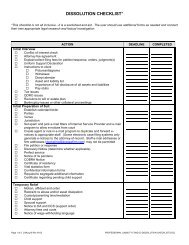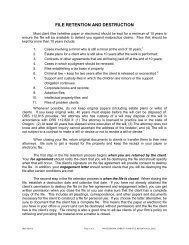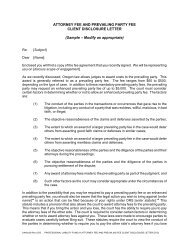ABA Model Guidelines for the Utilization of Paralegal Services
ABA Model Guidelines for the Utilization of Paralegal Services
ABA Model Guidelines for the Utilization of Paralegal Services
- No tags were found...
You also want an ePaper? Increase the reach of your titles
YUMPU automatically turns print PDFs into web optimized ePapers that Google loves.
Guideline 2: Provided <strong>the</strong> lawyer maintains responsibility <strong>for</strong> <strong>the</strong> work product, a<br />
lawyer may delegate to a paralegal any task normally per<strong>for</strong>med by <strong>the</strong> lawyer except<br />
those tasks proscribed to a nonlawyer by statute, court rule, administrative rule or<br />
regulation, controlling authority, <strong>the</strong> applicable rule <strong>of</strong> pr<strong>of</strong>essional conduct <strong>of</strong> <strong>the</strong><br />
jurisdiction in which <strong>the</strong> lawyer practices, or <strong>the</strong>se <strong>Guidelines</strong>.<br />
Comment to Guideline 2<br />
The essence <strong>of</strong> <strong>the</strong> definition <strong>of</strong> <strong>the</strong> term “legal assistant” first adopted by <strong>the</strong> <strong>ABA</strong> in<br />
1986 4 and subsequently amended in 1997 5 is that, so long as appropriate supervision is<br />
maintained, many tasks normally per<strong>for</strong>med by lawyers may be delegated to paralegals. EC 3-<br />
6 under <strong>the</strong> <strong>Model</strong> Code mentioned three specific kinds <strong>of</strong> tasks that paralegals may per<strong>for</strong>m<br />
under appropriate lawyer supervision: factual investigation and research, legal research, and<br />
<strong>the</strong> preparation <strong>of</strong> legal documents. Various states delineate more specific tasks in <strong>the</strong>ir<br />
guidelines including attending client conferences, corresponding with and obtaining in<strong>for</strong>mation<br />
from clients, witnessing <strong>the</strong> execution <strong>of</strong> documents, preparing transmittal letters, and<br />
maintaining estate/guardianship trust accounts. See, e.g., Colorado Bar Association <strong>Guidelines</strong><br />
<strong>for</strong> <strong>the</strong> Use <strong>of</strong> <strong>Paralegal</strong>s (<strong>the</strong> Colorado Bar Association has adopted guidelines <strong>for</strong> <strong>the</strong> use <strong>of</strong><br />
paralegals in 18 specialty practice areas including civil litigation, corporate law and estate<br />
planning); NALA Guideline 5.<br />
While appropriate delegation <strong>of</strong> tasks is encouraged and a broad array <strong>of</strong> tasks is<br />
properly delegable to paralegals, improper delegation <strong>of</strong> tasks will <strong>of</strong>ten run afoul <strong>of</strong> a lawyer’s<br />
obligations under applicable rules <strong>of</strong> pr<strong>of</strong>essional conduct. A common consequence <strong>of</strong> <strong>the</strong><br />
improper delegation <strong>of</strong> tasks is that <strong>the</strong> lawyer will have assisted <strong>the</strong> paralegal in <strong>the</strong><br />
unauthorized “practice <strong>of</strong> law” in violation <strong>of</strong> Rule 5.5 <strong>of</strong> <strong>the</strong> <strong>Model</strong> Rules, DR 3-101 <strong>of</strong> <strong>the</strong> <strong>Model</strong><br />
Code, and <strong>the</strong> pr<strong>of</strong>essional rules <strong>of</strong> most states. Nei<strong>the</strong>r <strong>the</strong> <strong>Model</strong> Rules nor <strong>the</strong> <strong>Model</strong> Code<br />
defines <strong>the</strong> “practice <strong>of</strong> law.” EC 3-5 under <strong>the</strong> <strong>Model</strong> Code gave some guidance by equating<br />
<strong>the</strong> practice <strong>of</strong> law to <strong>the</strong> application <strong>of</strong> <strong>the</strong> pr<strong>of</strong>essional judgment <strong>of</strong> <strong>the</strong> lawyer in solving clients’<br />
legal problems. This approach is consistent with that taken in <strong>ABA</strong> Opinion 316 (1967) which<br />
states: “A lawyer . . . may employ nonlawyers to do any task <strong>for</strong> him except counsel clients<br />
about law matters, engage directly in <strong>the</strong> practice <strong>of</strong> law, appear in court or appear in <strong>for</strong>mal<br />
proceedings as part <strong>of</strong> <strong>the</strong> judicial process, so long as it is he who takes <strong>the</strong> work and vouches<br />
<strong>for</strong> it to <strong>the</strong> client and becomes responsible <strong>for</strong> it to <strong>the</strong> client.”<br />
As a general matter, most state guidelines specify that paralegals may not appear be<strong>for</strong>e<br />
courts, administrative tribunals, or o<strong>the</strong>r adjudicatory bodies unless <strong>the</strong> procedural rules <strong>of</strong> <strong>the</strong><br />
adjudicatory body authorize such appearances. See, e.g., State Bar <strong>of</strong> Arizona, Committee on<br />
4<br />
5<br />
The 1986 <strong>ABA</strong> definition read: “A legal assistant is a person, qualified through<br />
education, training or work experience, who is employed or retained by a lawyer, law<br />
<strong>of</strong>fice, governmental agency, or o<strong>the</strong>r entity, in a capacity or function which involves <strong>the</strong><br />
per<strong>for</strong>mance, under <strong>the</strong> ultimate direction and supervision <strong>of</strong> an attorney, <strong>of</strong> specificallydelegated<br />
substantive legal work, which work, <strong>for</strong> <strong>the</strong> most part, requires a sufficient<br />
knowledge <strong>of</strong> legal concepts that, absent such assistant <strong>the</strong> attorney would per<strong>for</strong>m <strong>the</strong><br />
task.”<br />
In 1997, <strong>the</strong> <strong>ABA</strong> amended <strong>the</strong> definition <strong>of</strong> legal assistant by adopting <strong>the</strong> following<br />
language: “A legal assistant or paralegal is a person qualified by education, training or<br />
work experience who is employed or retained by a lawyer, law <strong>of</strong>fice, corporation,<br />
governmental agency or o<strong>the</strong>r entity who per<strong>for</strong>ms specifically delegated substantive<br />
legal work <strong>for</strong> which a lawyer is responsible.”<br />
Page 3
















